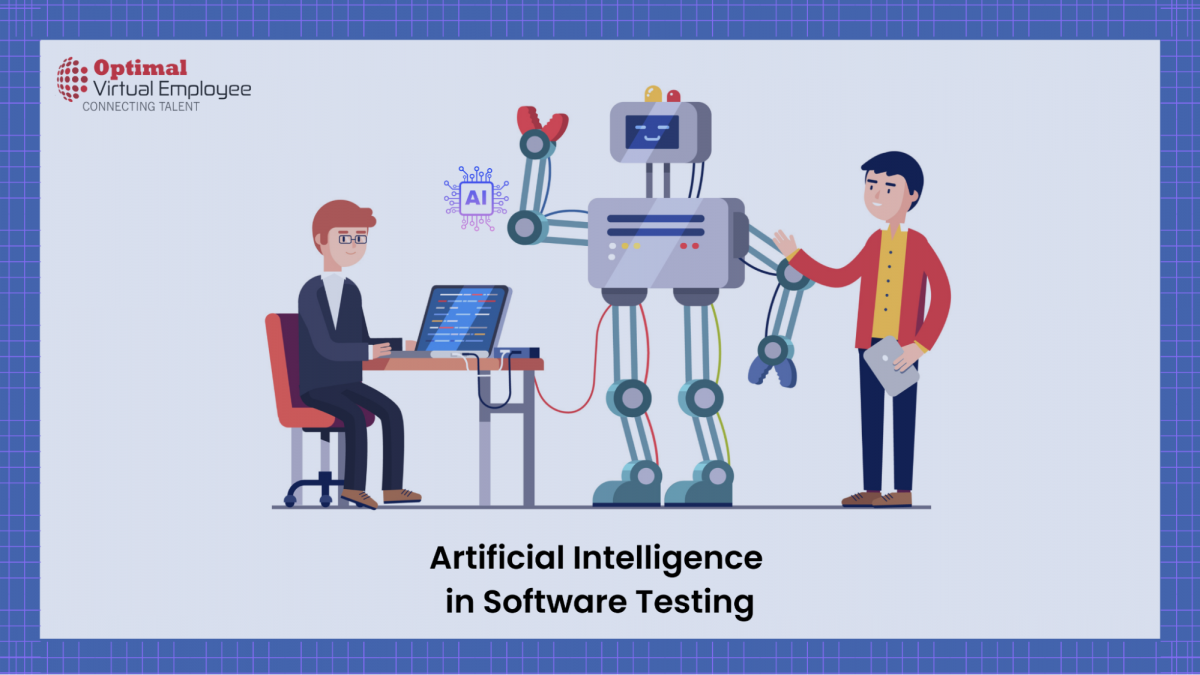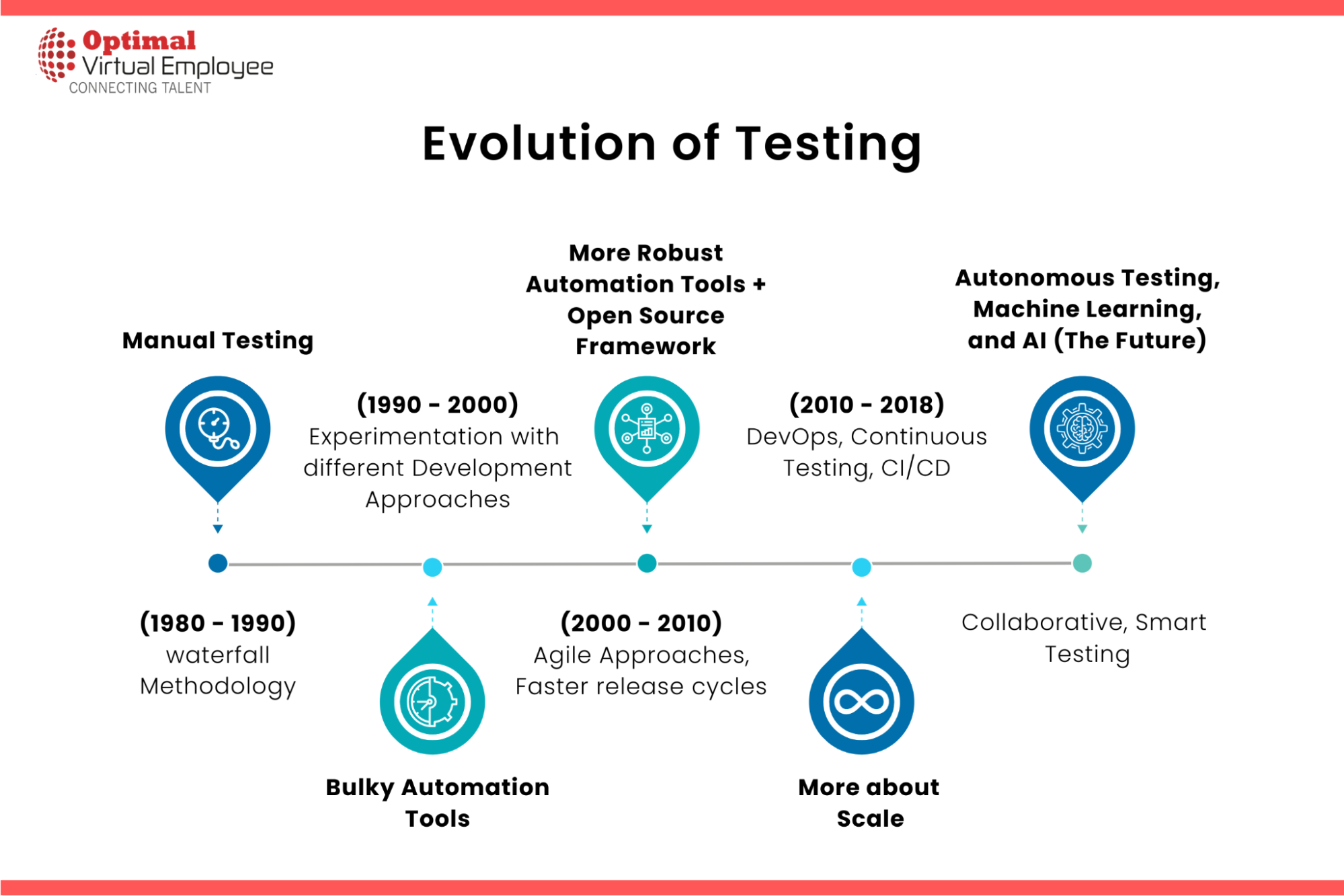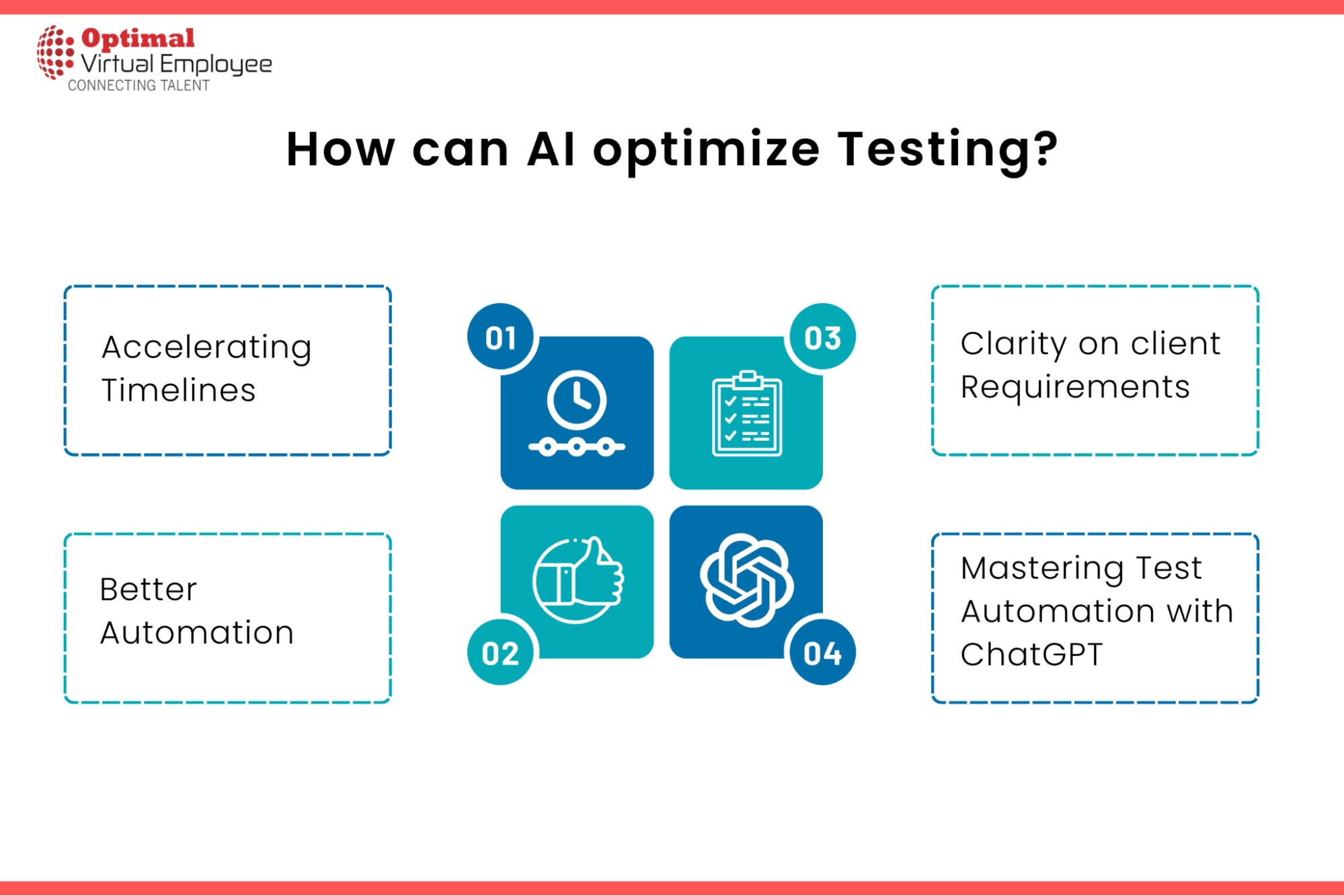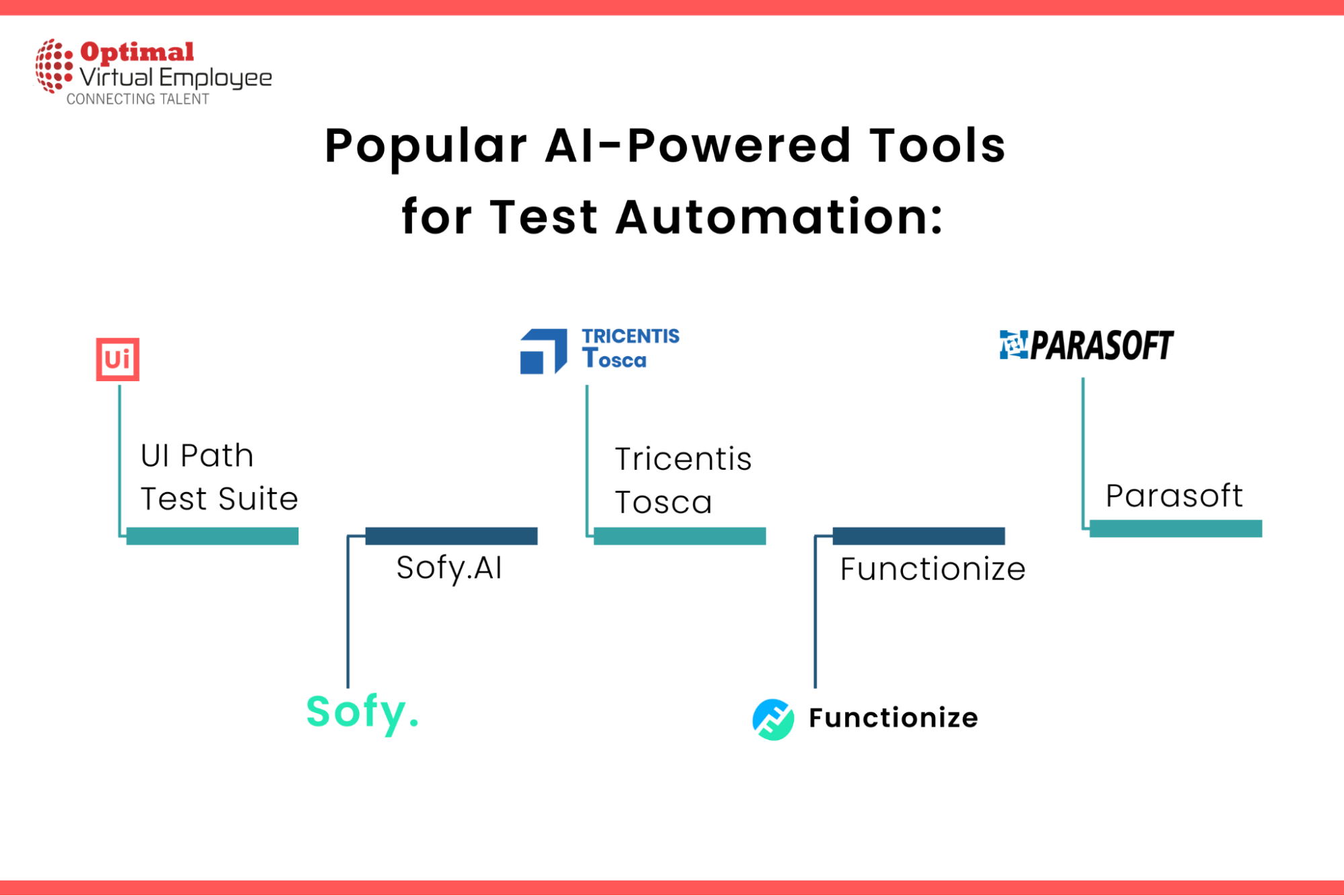The traditional approach to software testing is often labor-intensive, susceptible to errors, and expensive, slowing down the development process.
That’s why companies are now harnessing the transformative capabilities of Artificial Intelligence in the realm of software testing. It’s a game-changer that enhances precision, streamlines workflows and makes the process more cost-effective.
In this article, we’ll delve into the ways AI-powered test automation, flaw identification, and test strategizing are revolutionizing the field. Say farewell to tedious testing chores and unleash your team’s full capabilities through the seamless incorporation of AI into your software development process.
Join us as we explore the next frontier in software testing!
Grasping the Role of AI in Software Testing
Artificial Intelligence (AI) in the realm of software testing signifies a groundbreaking change in the quality assurance landscape. Moving away from conventional testing methods that are highly dependent on human involvement, AI employs machine learning algorithms and data analytics to streamline the testing procedure.
By analyzing past test data, AI is capable of efficiently discerning patterns, forecasting defects, and prioritizing test scenarios. This allows testing professionals to allocate their time and expertise to more complex and strategic responsibilities, as AI tackles mundane and time-intensive tests.
Adopting AI technology in software testing results in improved precision, quicker feedback loops, and a decrease in testing expenditures. As the industry wholeheartedly adopts this pivotal technology, businesses are gaining a competitive advantage by producing sturdy, fault-free software solutions for their customers.
Evolution of Testing
Testing has undergone a significant transformation, evolving in tandem with advancements in software development approaches and technology.
Manual Testing Era (1980-1990) – Dominance of Waterfall Methodology
In the initial years of software testing, the field was primarily ruled by manual testing methods. Testers ran test cases by hand to confirm the software’s functionality. The structured, phase-by-phase Waterfall methodology was the go-to approach during this period.
The advent of Early Automation Tools (1990-2000) – A Period of Methodological Exploration
As software grew increasingly complex, there arose a demand for swifter and more efficient testing techniques. The early stages of test automation were marked by cumbersome automation tools. Development teams started to explore various development approaches, setting the stage for the Agile Manifesto, which stressed the importance of collaboration, flexibility, and iterative development.
Sophisticated Automation Tools and Open Source Frameworks (2000-2010) – The Rise of Agile and Quick Release Cycles
The turn of the millennium witnessed the arrival of more refined and versatile testing tools. Agile methodologies took center stage, encouraging iterative development and expedited release schedules. Open-source frameworks like Selenium came to the fore, enabling testers to construct robust automated test systems. The synergy between development and testing teams got a boost, uplifting the quality of the end products.
Scaling and Continuous Practices (2010-2018) – The DevOps Revolution and CI/CD Integration
The spotlight then shifted towards scalability, operational efficiency, and the incorporation of continuous integration and continuous delivery (CI/CD) practices. The advent of DevOps culture narrowed the divide between development and operations, leading to more cohesive workflows. Continuous Testing evolved into an essential part of the development process, offering quick feedback and enabling speedy identification of issues. Automation in testing became crucial for maintaining a constant and reliable release cadence.
The Future: Autonomous Testing and AI-Driven Smart Testing Practices
As the frontier of software testing advances into the era of Artificial Intelligence (AI), we’re seeing the rise of Autonomous Testing, Machine Learning, and more intelligent testing methods. The testing environment is becoming increasingly collaborative, as AI-enabled tools work in synergy with human expertise.
With the capacity to process enormous datasets, predict possible flaws, and autonomously fine-tune test scenarios, AI-powered testing ushers in a new level of precision, speed, and software excellence. This paves the way for a more streamlined and dependable phase in software development.
This evolutionary path highlights the ever-changing interplay between testing strategies and software development paradigms. From the manual, Waterfall-based testing of yesteryears to today’s intelligent, collaborative testing enabled by AI, each phase has profoundly influenced how we assure software quality and deliver outstanding products to end-users.
How can AI optimize Testing?
Artificial Intelligence is transforming the field of software testing, opening up new avenues for enhancing multiple facets of the testing procedure.
Speeding Up Timelines
AI’s ability to sift through massive amounts of data and anticipate potential issues significantly trims testing timelines. It helps identify critical risk areas and ranks test cases by priority, allowing testers to focus their efforts where it matters most. This approach not only quickens the testing phase but also catches key defects early on, saving both time and resources in the long run.
Elevating Automation
Machine learning algorithms fuel AI-driven testing tools, enabling them to learn from historical data and continually enhance test coverage. This results in more comprehensive automated test suites, allowing human testers to apply their skills to more intricate cases. Meanwhile, routine and repetitive tests are effectively managed by AI-driven automation.
Sharpening Client Requirement Understanding
An AI-focused app development company can help sharpen the understanding and refinement of client needs. By sifting through previous project metrics and client feedback, AI systems can identify potential areas of ambiguity or conflict in the specifications. This clarity ensures that the final product closely aligns with client expectations, thereby reducing revisions and boosting customer satisfaction.
Test Automation Mastery with ChatGPT
AI-infused chatbots like ChatGPT can be invaluable tools in mastering the art of test automation. Testers can converse with these AI-driven agents to quickly retrieve relevant testing data, obtain code snippets for automating tests, or even resolve challenges related to automation. Such support eases the learning curve associated with test automation, making it more user-friendly for testers at different levels of expertise.
The adoption of AI in software testing heralds a future characterized by optimized software quality, accelerated development cycles, and elevated levels of customer satisfaction.
AI-Powered Test Automation
The advent of AI-powered test automation has been transformative in the software quality assurance landscape, taking the efficiency, precision, and adaptability of test automation to unprecedented levels. By harnessing the capabilities of artificial intelligence, companies specializing in quality assurance development have elevated the testing process.
These cutting-edge AI-based testing solutions can sift through large data sets, foresee likely challenges, and automatically fine-tune test scenarios. This expedites the overall testing cycle, enhances the scope of test coverage, and identifies key vulnerabilities sooner, ultimately lowering both development expenses and time-to-market.
Top 5 Popular AI-Powered Tools for Test Automation:
UIPath Test Suite Reimagined
UIPath Test Suite offers a powerful and user-friendly interface that utilizes AI-driven functionalities for streamlined test automation. Featuring sophisticated image and text recognition techniques, it proficiently manages both desktop and web-based applications, making it an excellent option for organizations looking for all-encompassing automation solutions.
Sofy.AI Unveiled
Sofy.AI is an AI-infused testing platform engineered to simplify the test automation landscape. Its self-sufficient testing engine leverages machine learning to autonomously generate and update test scripts, freeing testers to concentrate on higher-priority testing tasks. With support for ongoing testing across multiple devices and browsers, Sofy.AI is ideally suited for agile and DevOps workflows.
Introducing Tricentis Tosca
Tricentis Tosca stands as an all-inclusive test automation suite that incorporates Artificial Intelligence to facilitate smart test case design and optimization. Its AI-enabled risk-assessment features evaluate an application’s vulnerabilities and rank tests based on their importance. Its script-free automation approach speeds up both test creation and updates.
Functions Defined
Function is another AI-powered testing platform that employs machine learning for self-correcting tests. It auto-detects and fixes broken test scripts, minimizing the requirement for manual corrections. Additionally, its AI algorithms assist in dynamically generating test data, thereby increasing both test coverage and accuracy.
Overview of Parasoft
Parasoft delivers AI-enabled software testing solutions that address a wide array of testing requirements, such as functional, performance, and security testing. Utilizing machine learning, the platform autonomously crafts test cases spots critical flaws, and refines the test execution process. The AI features in Parasoft further enhance code review techniques and support continuous testing practices.
Conclusion
AI-driven defect detection is transforming the way companies maintain software excellence. By collaborating with a specialized quality assurance development firm, you gain access to cutting-edge machine learning algorithms that deliver quicker, more precise, and forward-thinking defect identification solutions.
Traditional approaches to defect detection often depend on labor-intensive manual reviews and tests, which are susceptible to human errors. In contrast, AI-driven defect detection automates this process, enabling meticulous scrutiny of expansive datasets and intricate code architectures.
These intelligent tools utilize historical defect data to learn, allowing them to recognize trends and irregularities that might otherwise go unnoticed. This predictive ability flags potential issues early in the development phase, cutting down the total expense involved in rectifying problems and accelerating the product’s time-to-market.
It’s essential for businesses to onboard machine learning app developers who possess the specialized skills needed to design and roll out custom defect detection models tailored to your specific project needs.
Engaging quality assurance developers experienced in AI-driven defect detection uplifts your software testing procedures to unprecedented levels of precision and efficiency. This not only improves the end product but also boosts customer trust and satisfaction, setting the stage for business expansion and long-term success.












